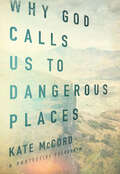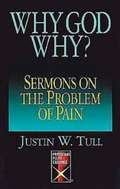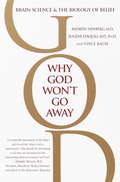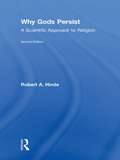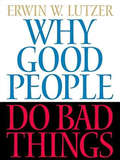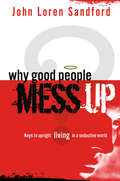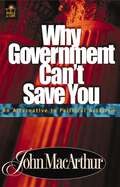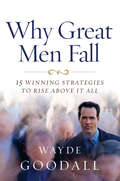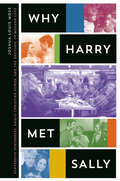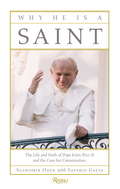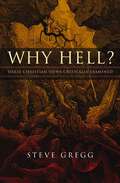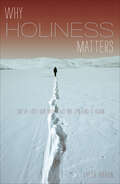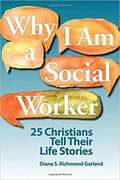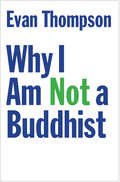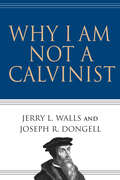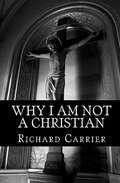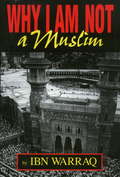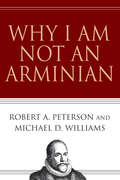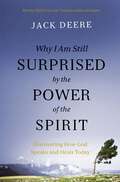- Table View
- List View
Why God Calls Us to Dangerous Places
by Kate McCord"Perhaps that&’s the greatest reason why He calls us to dangerous places: so that we will know His astonishing, sacrificial, life-restoring love.&”Why God Calls Us to Dangerous Places is about what is lost and what is gained when we follow God at any cost. Soon after 9/11, Kate McCord left the corporate world and followed God to Afghanistan—sometimes into the reach of death. Alive but not unscathed, she has suffered the loss of many things: comfort, safety, even dear friends and fellow sojourners.But Kate realizes that those who go are not the only ones who suffer. Those who love those who go also suffer. This book is for them, too. Weaving together Scripture, her story, and stories of both those who go and those who send, Kate considers why God calls us to dangerous places and what it means for all involved.It means dependence. It means loss. It means a firmer hold on hope. It can mean death, trauma, and heavy sorrow. But it can also mean joy unimaginable. Through suffering, we come closer to the heart of God. Written with the weight of glory in the shadow of loss, Why God Calls Us to Dangerous Places will inspire Christians to count the cost—and pay it.
Why God Calls Us to Dangerous Places
by Kate McCord"Perhaps that&’s the greatest reason why He calls us to dangerous places: so that we will know His astonishing, sacrificial, life-restoring love.&”Why God Calls Us to Dangerous Places is about what is lost and what is gained when we follow God at any cost. Soon after 9/11, Kate McCord left the corporate world and followed God to Afghanistan—sometimes into the reach of death. Alive but not unscathed, she has suffered the loss of many things: comfort, safety, even dear friends and fellow sojourners.But Kate realizes that those who go are not the only ones who suffer. Those who love those who go also suffer. This book is for them, too. Weaving together Scripture, her story, and stories of both those who go and those who send, Kate considers why God calls us to dangerous places and what it means for all involved.It means dependence. It means loss. It means a firmer hold on hope. It can mean death, trauma, and heavy sorrow. But it can also mean joy unimaginable. Through suffering, we come closer to the heart of God. Written with the weight of glory in the shadow of loss, Why God Calls Us to Dangerous Places will inspire Christians to count the cost—and pay it.
Why God Why?: Sermons on the Problem of Pain (Protestant Pulpit Exchange)
by Justin W. TullThis collection of sermons explores the age-old question of why a loving God allows suffering to visit His children. Tull encourages readers to ask why in good times as well as in difficult ones, to examine God's eternal presence in times of blessed joy as well as during sorrow and care. He emphasizes scriptures and anecdotes that illustrate God's comfort and grace during all situations in our lives.
Why God Won't Go Away: Brain Science and the Biology of Belief
by Andrew Newberg Eugene G. D'AquiliWhy have we humans always longed to connect with something larger than ourselves? Why does consciousness inevitably involve us in a spiritual quest? Why, in short, won't God go away? Theologians, philosophers, and psychologists have debated this question through the ages, arriving at a range of contradictory and ultimately unprovable answers. But in this brilliant, groundbreaking new book, researchers Andrew Newberg and Eugene d'Aquili offer an explanation that is at once profoundly simple and scientifically precise: the religious impulse is rooted in the biology of the brain. Newberg and d'Aquili base this revolutionary conclusion on a long-term investigation of brain function and behavior as well as studies they conducted using high-tech imaging techniques to examine the brains of meditating Buddhists and Franciscan nuns at prayer. What they discovered was that intensely focused spiritual contemplation triggers an alteration in the activity of the brain that leads us to perceive transcendent religious experiences as solid and tangibly real. In other words, the sensation that Buddhists call "oneness with the universe" and the Franciscans attribute to the palpable presence of God is not a delusion or a manifestation of wishful thinking but rather a chain of neurological events that can be objectively observed, recorded, and actually photographed.The inescapable conclusion is that God is hard-wired into the human brain.In Why God Won't Go Away, Newberg and d'Aquili document their pioneering explorations in the field of neurotheology, an emerging discipline dedicated to understanding the complex relationship between spirituality and the brain. Along the way, they delve into such essential questions as whether humans are biologically compelled to make myths; what is the evolutionary connection between religious ecstasy and sexual orgasm; what do Near Death Experiences reveal about the nature of spiritual phenomena; and how does ritual create its own neurological environment. As their journey unfolds, Newberg and d'Aquili realize that a single, overarching question lies at the heart of their pursuit: Is religion merely a product of biology or has the human brain been mysteriously endowed with the unique capacity to reach and know God?Blending cutting-edge science with illuminating insights into the nature of consciousness and spirituality, Why God Won't Go Away bridges faith and reason, mysticism and empirical data. The neurological basis of how the brain identifies the "real" is nothing short of miraculous. This fascinating, eye-opening book dares to explore both the miracle and the biology of our enduring relationship with God.
Why Gods Persist: A Scientific Approach to Religion
by Robert Hinde Robert A. HindeWhat is it about religion that appeals to people? Why do religions and religious beliefs persist in the face of increasing secularisation, harsh criticism and even political persecution? Robert Hinde argues that it is not enough simply to criticize religion, we must understand it - not only how it causes so much conflict, but also how it brings comfort to many. Hinde, a distinguished scientist, draws on a wide range of psychological, developmental and evolutionary research to explore this fascinating question. This second edition of Why Gods Persist is designed for everyone interested in the subject, either as a student of psychology and anthropology of religion or as a follower of the current controversies over the value of religious belief.
Why Good People Do Bad Things
by Erwin LutzerWe are all deceived, driven by selfish desires, and incapable of doing what we know to be right in our own human strength. Premier Bible teacher Dr. Erwin Lutzer explains the hopeful reality that change is possible through the sometimes painful process of God-given revelation and honesty.
Why Good People Mess Up: Keys to upright living in a seductive world
by John Loren SandfordWhy Good People Mess UpBy John Loren Sandford Why do good people fall into immorality? This book describes powerful, unseen forces that drive some Christians into adultery, fornication, homosexuality, incest, and other sexual sins. It includes practical guidelines and understanding for everyone involved—help and hope for the believer who wants to stand in the face of overwhelming sexual compulsions, and forgiveness and knowledge for one who has been hurt by leaders who have fallen. About the AuthorJOHN LOREN SANDFORD graduated from theological seminary with an M. Div. in religion. He pastored churches for twenty-one years before founding Elijah House.
Why Government Can't Save You: An Alternative to Political Activism
by John MacarthurThe Lord did not come as a political deliverer or social reformer. He did not rally supporters in a grandiose attempt to "capture the culture" for morality or greater political and religious freedom. Rather, His divine calling was to rescue the lost souls of individual men and women from sin and hell. In Why Government Can't Save You: An Alternative to Political Activism, author John MacArthur illustrates through Scripture that, regardless of the numerous immoral, unjuust, and ungodly failures of secular government, believers are to pray and seek to influence the world for Christ by godly, selfless, and peaceful living under that authority, not by protests against the government or by acts of civil disobedience. Dr. MacArthur will explore these areas: Christians' responsibility to authority How and why we should support our leaders How to live righteously in a pagan culture The principle of paying taxes Jesus' lessons on tax exemptions The biblical purpose of government The principle and reasons for civil obedience. "To devote all, or even most, of our time, energy, money, and strategy to putting a façade of morality on the world or the appearance of 'rightness' over our governmental and political institutions is to badly misunderstand our roles as Christians in a spiritually lost world." ?John MacArthur
Why Great Men Fall
by Wayde GoodallYour head sits heavily in your hands as the last employee turns out the last light and goes home for the night, leaving you alone in the dark with your failure and desperation. This scene is played-out daily in offices all over America, as leaders in corporations, churches, and organizations free-fall from moral or ethical failure. Wayde Goodall has observed this quagmire for decades, counseling those who have thrown away their families and their futures for a moment of pleasure or profit. Profiling well-known leaders who've had a fall from grace, Goodall notes the common traits, warning signs, and most importantly, a plan for avoiding such deadly traps of the soul. For everyone who has found himself in this terrible dilemma, and to those who can still avoid it, this book is like a beacon. There is a fail-safe guide for remaining on the right path, and Why Great Men Fall illustrates that safe route in a riveting way. One after the other, great men are falling like dominoes as they defy the profound wisdom of Scripture, make themselves into their own god and satisfy their most base desires. If you are already experiencing substantial fame, power or wealth or, more importantly, if you are approaching that possibility in your life, this well be one of the most important books you will ever read. -Barry Meguiar, President/CEO of Meguiar?s, Inc, and host of FOX?s Speed Channel program, Car Crazy Television Wayde Goodall has shared a brief but masterful guide to leadership in WHY GREAT MEN FALL. Having known Wayde as an exceptional leader for over 20 years, it is obvious that this is the life story and lessons learned by a great, humble leader whose "life lessons" blended with the truth of God's Word, give us a page turner that addresses the personal issues of today. -Dr. Tom Phillips, Director of the Billy Graham Cove & Director of Crusades for Billy Graham Crusades Anyone can read the headlines. It takes a finer mind to go behind the faces of scandalized celebrities and their lurid exploits. Dr. Goodall combines discernment, insight, and an engaging contemporaneity to turn the tale of the fallen into wisdom for those willing to learn.-Mark Rutland, President, Southeastern University
Why Harry Met Sally: Subversive Jewishness, Anglo-Christian Power, and the Rhetoric of Modern Love
by Joshua Louis MossFrom immigrant ghetto love stories such as The Cohens and the Kellys (1926), through romantic comedies including Meet the Parents (2000) and Knocked Up (2007), to television series such as Transparent (2014–), Jewish-Christian couplings have been a staple of popular culture for over a century. In these pairings, Joshua Louis Moss argues, the unruly screen Jew is the privileged representative of progressivism, secular modernism, and the cosmopolitan sensibilities of the mass-media age. But his/her unruliness is nearly always contained through romantic union with the Anglo-Christian partner. This Jewish-Christian meta-narrative has recurred time and again as one of the most powerful and enduring, although unrecognized, mass-culture fantasies. Using the innovative framework of coupling theory, Why Harry Met Sally surveys three major waves of Jewish-Christian couplings in popular American literature, theater, film, and television. Moss explores how first-wave European and American creators in the early twentieth century used such couplings as an extension of modernist sensibilities and the American “melting pot.” He then looks at how New Hollywood of the late 1960s revived these couplings as a sexually provocative response to the political conservatism and representational absences of postwar America. Finally, Moss identifies the third wave as emerging in television sitcoms, Broadway musicals, and “gross-out” film comedies to grapple with the impact of American economic globalism since the 1990s. He demonstrates that, whether perceived as a threat or a triumph, Jewish-Christian couplings provide a visceral, easily graspable, template for understanding the rapid transformations of an increasingly globalized world.
Why Harry Met Sally: Subversive Jewishness, Anglo-Christian Power, and the Rhetoric of Modern Love
by Joshua Louis MossFrom immigrant ghetto love stories such as The Cohens and the Kellys (1926), through romantic comedies including Meet the Parents (2000) and Knocked Up (2007), to television series such as Transparent (2014–), Jewish-Christian couplings have been a staple of popular culture for over a century. In these pairings, Joshua Louis Moss argues, the unruly screen Jew is the privileged representative of progressivism, secular modernism, and the cosmopolitan sensibilities of the mass-media age. But his/her unruliness is nearly always contained through romantic union with the Anglo-Christian partner. This Jewish-Christian meta-narrative has recurred time and again as one of the most powerful and enduring, although unrecognized, mass-culture fantasies. Using the innovative framework of coupling theory, Why Harry Met Sally surveys three major waves of Jewish-Christian couplings in popular American literature, theater, film, and television. Moss explores how first-wave European and American creators in the early twentieth century used such couplings as an extension of modernist sensibilities and the American “melting pot.” He then looks at how New Hollywood of the late 1960s revived these couplings as a sexually provocative response to the political conservatism and representational absences of postwar America. Finally, Moss identifies the third wave as emerging in television sitcoms, Broadway musicals, and “gross-out” film comedies to grapple with the impact of American economic globalism since the 1990s. He demonstrates that, whether perceived as a threat or a triumph, Jewish-Christian couplings provide a visceral, easily graspable, template for understanding the rapid transformations of an increasingly globalized world.
Why He Is a Saint
by Slawomir Oder Saverio GaetaAvailable in English for the first time, this engaging and enlightening biography of John Paul II argues the case that the late pope's life and deeds make him a worthy saint.A number-one best seller in Italy, Why He Is a Saint is an account of the late pope's life, highlighting his deep Christian faith, his dedication to the Church, and his role in bringing down communism. This book delves deeply into Pope John Paul's spiritual essence, through the unprecedented light of the investigation into whether he merits sainthood. Why He Is a Saint reveals the pope's life through vivid, intimate anecdotes. Among the book's startling revelations are his thoughts of retirement as his health declined, and the fact that he practiced the ancient ritual of daily self-flagellation. The book includes both unpublished as well as public correspondence, such as the "open letter" of forgiveness to Ali Agka, his attempted assassin. It also examines the pope's severe acts of penitence and documents his miracles. This impassioned plea in favor of canonizing the pope as a saint has proven to be of profound interest to Catholics worldwide, as well as to anyone interested in faith and spirituality.
Why Hell?: Three Christian Views Critically Examined
by Steve GreggMost people believe that hell is the final state of the condemned following the final judgment. At the same time, many people cannot comprehend why God created hell for the unsaved. Respected church fathers held a variety of views dating back to the early centuries of the church. This book explains views on why hell exists: unending suffering, the annihilation of the unrepentant, and the rehabilitation of the lost. Most Christians are unaware of the scriptural basis for each of these positions. Why Hell? is meant to educate the interested reader without advocating for any one point of view. The following are some of the book's features:Biblical vocabulary of hell and positions held throughout early Christian historyPositive cases presented on three perspectives: traditionalist, conditionalist, and restorationistCritiques of each viewHelpful charts at the back of the book that summarize and cross-examine the arguments for each viewSteve Gregg provides food for thought for both trained theologians and serious Christian readers who want all the data and then consider for themselves the consequences of three Christian perspectives on hell.
Why Holiness Matters: We've Lost Our Way--But We Can Find it Again
by Tyler BraunHave we tried so hard to avoid being holier-than-thou that we&’ve forgotten how important it is to be holy?Authenticity matters. Transparency matters. Being open about our shortcomings, misgivings, and failures matters. Yet holiness also matters. This book is a timely reminder not to lose the old priorities as we take on the new, albeit noble, ones. Millennial author Tyler Braun helps us understand that holiness is not just some fine ideal destined for generations past; it&’s the unyielding pursuit that defines every Christian life. The beginning of our calling toward a holy life is the challenge of loving God more deeply. Holiness is not found in strict rule keeping alone; it is found in our desire of the Holy One. Holiness is not new behaviors. Holiness is new affections.
Why Holiness Matters: We've Lost Our Way--But We Can Find it Again
by Tyler BraunHave we tried so hard to avoid being holier-than-thou that we&’ve forgotten how important it is to be holy?Authenticity matters. Transparency matters. Being open about our shortcomings, misgivings, and failures matters. Yet holiness also matters. This book is a timely reminder not to lose the old priorities as we take on the new, albeit noble, ones. Millennial author Tyler Braun helps us understand that holiness is not just some fine ideal destined for generations past; it&’s the unyielding pursuit that defines every Christian life. The beginning of our calling toward a holy life is the challenge of loving God more deeply. Holiness is not found in strict rule keeping alone; it is found in our desire of the Holy One. Holiness is not new behaviors. Holiness is new affections.
Why I Am A Social Worker: 25 Christians Tell Their Life Stories
by GarlandWhy I Am a Social Worker describes the rich diversity and nature of the profession of social work through the 25 stories of daily lives and professional journeys chosen to represent the different people, groups and human situations where social workers serve. Many social workers of faith express that they feel called to help people - sometimes a specific population of people such as abused children or people who live in poverty. Often they describe this calling as a way of living out their faith. Why I Am a Social Worker serves as a resource for Christians in social work as they reflect on their sense of calling, and provides direction to guide them in this process. Why I Am a Social Worker employs a narrative, descriptive approach, allowing the relationship between faith and practice to emerge through the professional life stories of social workers who are Christians. As such, it provides a way to explore integration on personal, emotional and practical levels. Why I Am a Social Worker does not varnish the difficulties and struggles of this integration journey, but if you want to understand what social work is and how Christians live their faith from the experiences of actual social work, this book is for you. Why I Am a Social Worker has three main objectives: 1) To describe the path of Christians into social work, how their work is an expression of their faith, and how their faith motivates, sustains, and is challenged by their work. 2) To sample the breadth of social work as a profession, from public to private and from nonsectarian to religious congregational settings, and how faith finds a diversity of expressions. 3) To serve as a resource for exploring the ethical integration of faith with professional practice. Why I Am a Social Worker addresses a range of critical questions such as: a) How do social workers describe the relationship of their faith and their work? b) What is their daily work-life like, with its challenges, frustrations, joys and triumphs? c) What was their path into social work, and more particularly, the kind of social work they chose? d) What roles do their religious beliefs and spiritual practices have in sustaining them for the work, and how has their work, in turn, shaped their religious and spiritual life? Why I Am a Social Worker will provide you with a realistic view of the gritty realities of a profession that is at the forefront of serving those Jesus described as the least of these (Matthew 25).
Why I Am Not A Christian: And Other Essays On Religion And Related Subjects
by Bertrand RussellThoughts on life after death, man's place in the universe, and other contemplative subjects.
Why I Am Not a Buddhist
by Evan ThompsonA provocative essay challenging the idea of Buddhist exceptionalism, from one of the world&’s most widely respected philosophers and writers on Buddhism and science Buddhism has become a uniquely favored religion in our modern age. A burgeoning number of books extol the scientifically proven benefits of meditation and mindfulness for everything ranging from business to romance. There are conferences, courses, and celebrities promoting the notion that Buddhism is spirituality for the rational; compatible with cutting-edge science; indeed, &“a science of the mind.&” In this provocative book, Evan Thompson argues that this representation of Buddhism is false. In lucid and entertaining prose, Thompson dives deep into both Western and Buddhist philosophy to explain how the goals of science and religion are fundamentally different. Efforts to seek their unification are wrongheaded and promote mistaken ideas of both. He suggests cosmopolitanism instead, a worldview with deep roots in both Eastern and Western traditions. Smart, sympathetic, and intellectually ambitious, this book is a must-read for anyone interested in Buddhism&’s place in our world today.
Why I Am Not a Calvinist
by Jerry L. Walls Joseph R. DongellWhat's wrong with Calvinism? Since the Reformation, Calvinism has dominated much of evangelical thought. It has been so well established that many Christians simply assume it to be the truest expression of Christian doctrine. But Calvinism has some serious biblical and theological weaknesses that unsettle laypeople, pastors and scholars alike. God is sovereign. All evangelical Christians--whether Arminians or Calvinists--have no doubt about this fundamental truth. But how does God express his sovereignty? Is God a master puppeteer, pulling our strings? Or has he graciously given his children freedom to respond to his love? In this eminently readable book, Jerry L. Walls and Joseph R. Dongell explore the flaws of Calvinist theology. Why I Am Not a Calvinist is a must-read for all who struggle with the limitations of this dominant perspective within evangelical theology.
Why I Am Not a Christian: Four Conclusive Reasons to Reject the Faith
by Richard CarrierDr. Richard Carrier, world renowned philosopher and historian, explains the four reasons he does not accept the Christian religion, describing four facts of the world that, had they been different, he would believe. He is brief, clear, and down to earth, covering the whole topic in under ninety pages of easy to-read explanation. Those four reasons are God's silence, God's inaction, the lack of evidence, and the way the universe looks exactly like a godless universe would, and not at all like a Christian universe would, even down to its very structure. Dr. Carrier addresses all the usual replies to these claims, in ways you might not have heard before, relying on his wide experience in debating and studying these issues all over the world for more than fifteen years. A perfect book to introduce yourself, or your friends, to why fewer educated people are embracing Christianity than ever before. Ideal for handing out to door-to-door missionaries.
Why I Am Not a Muslim
by Ibn WarraqThose who practice the Muslim faith have resisted examinations of their religion. They are extremely guarded about their religion, and what they consider blasphemous acts by skeptical Muslims and non-Muslims alike has only served to pique the world's curiosity. This critical examination reveals an unflattering picture of the faith and its practitioners. Nevertheless, it is the truth, something that has either been deliberately concealed by modern scholars or buried in obscure journals accessible only to a select few.
Why I Am Not a Muslim
by Ibn WarraqThose who practice the Muslim faith have resisted examinations of their religion. They are extremely guarded about their religion, and what they consider blasphemous acts by skeptical Muslims and non-Muslims alike has only served to pique the world's curiosity. This critical examination reveals an unflattering picture of the faith and its practitioners. Nevertheless, it is the truth, something that has either been deliberately concealed by modern scholars or buried in obscure journals accessible only to a select few.
Why I Am Not a Muslim
by Ibn WarraqThose who practice the Muslim faith have resisted examinations of their religion. They are extremely guarded about their religion, and what they consider blasphemous acts by skeptical Muslims and non-Muslims alike has only served to pique the world's curiosity. This critical examination reveals an unflattering picture of the faith and its practitioners. Nevertheless, it is the truth, something that has either been deliberately concealed by modern scholars or buried in obscure journals accessible only to a select few.
Why I Am Not an Arminian
by Robert A. Peterson Michael D. WilliamsWhat's wrong with Arminianism? Arminian theology is sweeping through the evangelical churches of North America. While most Arminians are good, sincere, orthodox Christians, authors Robert A. Peterson and Michael D. Williams contend that aspects of Arminian thought are troubling both biblically and theologically. In particular, they argue, Arminians have too lofty a view of human nature and an inadequate understanding of God's sovereign love in Christ. Why I Am Not an Arminian explores the biblical, theological and historical background to the Calvinist-Arminian debate. The irenic nature and keen insight of this book will be appreciated by laypeople, pastors and scholars alike.
Why I Am Still Surprised by the Power of the Spirit: Discovering How God Speaks and Heals Today
by Jack S. DeereWhen Jack Deere turned seventeen, he did not know God or a single verse of Scripture. At twenty-seven, he became a professor of Old Testament Exegesis and Semitic Languages at Dallas Theological Seminary. He started and pastored an influential church in Ft. Worth, Texas. He taught his church and his students that God no longer gave the "miraculous gifts of the Spirit" or spoke outside the pages of Scripture.After teaching seminary for ten years, a bestselling author shocked Deere when he told him that he not only believed God was regularly healing people today, but that he had seen undeniable miracles in answer to his prayers. For the next four months, Deere studied every healing story in the New Testament. This time he came to those stories with the open mind of a scholar, completely at home in the original languages of the Bible, not as a gullible student swallowing the prejudices of his teachers. At the end of those four months, Deere was convinced, against his will, that God was still healing and speaking just as he had done in the New Testament.Deere and his wife Leesa began to pray for people in their church and witnessed dramatic, documented healings.In Why I Am Still Surprised by the Power of the Spirit, Deere demonstrates that the Scriptures teach that God is healing and speaking today just as he did 2000 years ago. He tells documented stories of modern miracles. He explains the nature of spiritual gifts, defines each spiritual gift, offers sound advice on discovering and using the gifts in church today. He shows how all of this part of God's way of deepening our friendship with him.A modern classic, Surprised by the Power of the Spirit was published twenty-five years ago, and in that book Deere claimed that he would live long enough to see the majority of conservative evangelicals come to believe in all the gifts of the Spirit. That has come true. The theological landscape has changed dramatically. Nearly completely rewritten, this new edition still offers that proof but has about seventy percent new material on the practical matters of experiencing and using spiritual gifts. For example, anyone who prays regularly for the sick will encounter demonic power. Demons pop up all over the Synoptic Gospels. There are two new chapters on ministering to the demonized. There is much confusion on what it means to be filled with the Spirit today. Deere takes three chapters to examine every use of "filled with the Spirit" and "full of the Spirit" in the New Testament to show why and how God still fills his servants with the Holy Spirit. There are many new stories of God's power, even walking on water and multiplying food. Deere also introduces the newest literature defending and explaining the gifts of the Spirit. All this and more continues the book's legacy for a new time.
